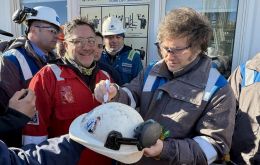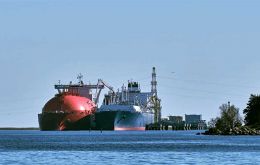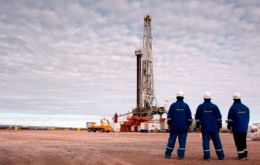MercoPress. South Atlantic News Agency
Tag: Vaca Muerta
-
Friday, August 9th 2024 - 10:55 UTC
Milei tours Vaca Muerta and Chile with a focus on energy investments

Argentine President Javier Milei resumed his mileage accruing habit Thursday with a trip to Vaca Muerta in the Patagonian province of Neuquén and later to Santiago, where he met with local businessmen but not with Gabriel Boric Font.
-
Tuesday, July 9th 2024 - 14:48 UTC
Argentina on track to become a global exporter of LNG by 2027

Argentina could be on the path to start exporting LNG from its Vaca Muerta shale gas deposits, after Golar LNG signed a 20'year deal with Pan American Energy (PAE) for the deployment of a Floating Liquefied Natural Gas (FLNG) vessel in Argentina according to a report from US Energy Information Administration.
-
Monday, April 15th 2024 - 23:59 UTC
Brazil and Argentina have much in common despite opposing presidents

Foreign Ministers Mauro Vieira of Brazil and Diana Mondino of Argentina met in Brasilia on Monday for talks aimed at bringing South America's two largest countries closer together, despite the opposing views of presidents Luiz Inácio Lula da Silva and Javier Milei, especially on each other.
-
Thursday, November 10th 2022 - 09:38 UTC
Argentina's industries highlight exports needed to make up for lack of US dollars

Leaders of Argentina's Industrial Union (UIA) Wednesday highlighted the country's export potential, particularly that of Vaca Muerta, to make up for the loss of foreign currency affecting the nation's coffers.
-
Friday, August 26th 2022 - 09:55 UTC
Indian FM welcomed at Casa Rosada

Argentine President Alberto Fernández Thursday welcomed Indian Foreign Minister Subrahmanyam Jaishankar. During the meeting, bilateral issues were discussed, in addition to the South American country's desire to join the BRICS alliance. Also present during the encounter was Argentine Foreign Minister Santiago Cafiero.
-
Wednesday, June 22nd 2022 - 20:11 UTC
Unconventional production boosts oil and gas output in Argentina

Argentina's oil output reached its zenith in 20 years with 584,000 barrels per day (bpd) delivered in May of 2022, thanks mostly to unconventional developments, it was reported Tuesday.
-
Tuesday, May 10th 2022 - 19:55 UTC
Ukrainian crisis tops agenda in Fernández-Sánchez meeting in Madrid

Argentine President Alberto Fernández Tuesday met in Madrid with Spanish Prime Minister Pedro Sánchez on the first day of his European tour which will also include encounters with German Chancellor Olaf Scholz and French President Emmanuel Macron.
-
Friday, April 22nd 2022 - 09:53 UTC
Argentine President launches construction of new gas pipeline

Argentine President Alberto Fernández Thursday launched the “Néstor Kirchner” gas pipeline project during a ceremony at the Loma Campana field in Vaca Muerta, province of Neuquén.
-
Wednesday, April 13th 2022 - 09:53 UTC
“It's going to be a long cold winter in Buenos Aires”

By Haley Zaremba, Oilprice.com – A fuel shortage is causing political turmoil and social unrest in Argentina, and could even result in a food shortage as the South American nation’s grain transporters call or a strike in the face of sky-high fuel prices during the harvest season for soy and corn.
-
Wednesday, March 30th 2022 - 09:59 UTC
Cold winter and fuel shortages ahead for Argentina

Argentina is on the world's top short list of countries with the largest reserves of gas, but given its political chaos, rabid nationalism and constant changes to the rules of the game, investors remain shy and Argentina will have to prepare for a cold austral winter and even fuel rationing as it's already happening with diesel, desperately needed to harvest summer crops and prepare the soil for summer sowing.
